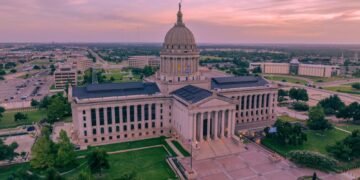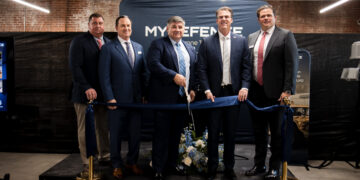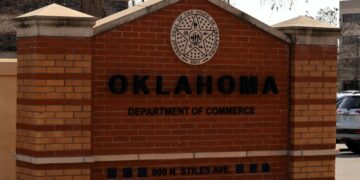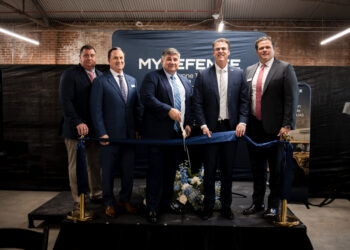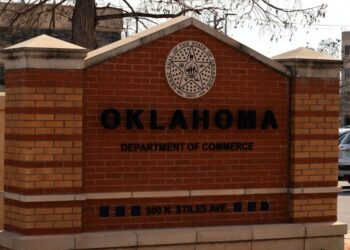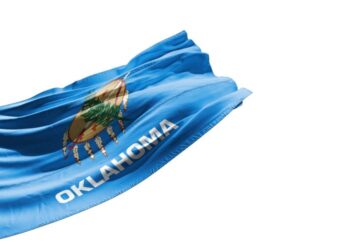OKLAHOMA CITY (OBV) – The Oklahoma Secretary of State’s Office verified the signatures submitted in support of State Question 832 (SQ 832), a ballot initiative that seeks to raise the minimum wage, and the Oklahoma Supreme Court is now reviewing the certification.
SQ 832 supporters delivered dozens of boxes filled with nearly 180,000 signatures from across the state in support of raising the minimum wage, last month.
The Secretary of State’s Office verified 157,287 signatures of the nearly 180,000 signatures delivered last month to the SOS office, according to Will Milam, counselor to Secretary of State Josh Cockroft. The signatures were collected throughout the state by Oklahomans who support raising the state’s minimum wage. The ballot initiative needed 92,263 signatures to qualify for placement on a state ballot.
“We have submitted our certification for the verification of the signatures to the Oklahoma Supreme Court and we are waiting for an order from the Supreme Court determining numerical sufficiency,” Milam said while speaking with OBV on Tuesday.
Oklahoma Attorney General Gentner Drummond wrote a new ballot title for SQ 832. The Secretary of State’s Office received the new ballot title Friday afternoon.
The Secretary of State’s Office submitted its certification, which includes the new ballot title, to the Supreme Court on Monday morning.
“Everything that is with the Supreme Court is up to date,” Milam said. “The Supreme Court will issue an order determining the numerical sufficiency of the signatures, and that will be filed with our office, and our office will file a notice that will have many details.”
There will be a 10-day challenge period after the Secretary of State’s Office publishes its notice.
The publication of the notice essentially opens up the challenge period. The notice states there are enough signatures and asks if any citizen objects to the number or validity of the signatures or the clarified title from the attorney general’s office.
The Supreme Court must review any objections filed within the 10-day period.
“So, [in that instance], they file an order and resolve the objections,” Milam said. “[But] if there is no objection filed in those 10 days and the Supreme Court says the number [of signatures] is sufficient, then our office will notify the governor that the ballot title is correct and sufficient, then the governor will issue a proclamation calling for an election for the state question.”
The State Chamber of Oklahoma and the Oklahoma Farm Bureau oppose the ballot initiative, having previously challenged SQ 832 in the Supreme Court.
“We are aware that the Secretary of State’s Office has concluded their signature verification process and are evaluating all of our legal options,” said Chad Warmington, president and CEO of The State Chamber. “The passage of this state question would be devastating for small businesses and farms across Oklahoma. We intend to fight it every step of the way.”
Amber England, campaign spokesperson for Raise the Wage Oklahoma, said in July that many Oklahomans struggle to earn a living wage.
“We just know that it makes common sense that when gas, groceries and housing keep going up, that wages should too. Oklahoma ranks 47th in the number of low wage workers in the country. And because our minimum wage hasn’t been raised since 2009 – that’s 15 years – wages are actually kept low. The floor for low wages is kept really, really low because our state’s minimum wage is $7.25 an hour,” England said.
Ben Lepak, executive director of the State Chamber Research Foundation, said the minimum wage increase which SQ 832 calls for will be detrimental to Oklahoma businesses.
“In the time that SQ 832 has been circulating for signatures, our stance has not changed. This is a disastrous policy that will crush working families through price increases on the heels of record inflation. This ballot initiative is bad for workers, bad for business, and bad for Oklahoma, and we are confident the voters of the State of Oklahoma will concur with our position,” Lepak said. “We look forward to a vigorous campaign to educate Oklahomans about the initiative that will put corner stores and family farms out of business.”
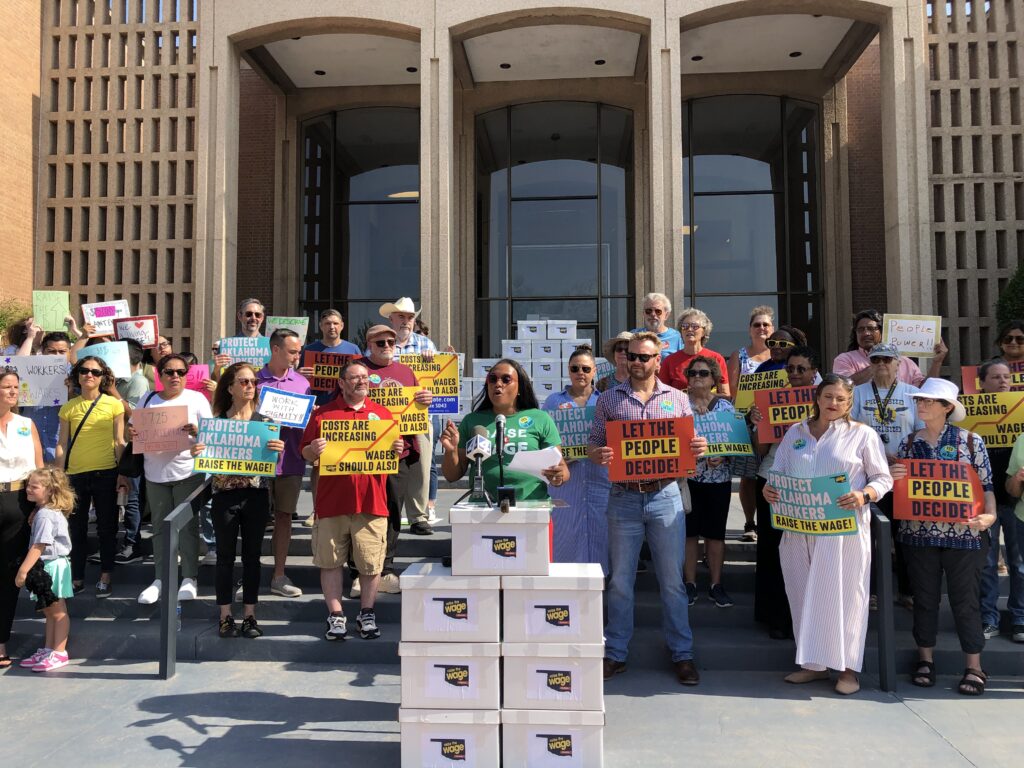
State Question 832 seeks to amend the Oklahoma Minimum Wage Act and increase the minimum wage by untying the state from the federal minimum wage. The amendment, if approved, would require employers to pay employees at least $9 per hour beginning in 2025, $10.50 per hour beginning 2026, $12 per hour beginning in 2027, $13.50 per hour beginning in 2028 and $15 per hour beginning in 2029. The wage will increase with the cost of living, beginning in 2030, as measured by the U.S. Department of Labor’s Consumer Price Index for Urban Wage Earners and Clerical Workers (CPI-W).
It is currently unknown if SQ 832 will be on November’s general election ballot or if a special election will be held. House Bill 1105 from the recent legislative session increased the protest window from 10 to 90 days.
“If we’re not on the November ballot, then the governor would set a special election. He has to give 70 days’ notice, once we make it through all the steps,” England said. “We’ll be ready whenever it’s on the ballot, and we look forward to a vigorous campaign and telling the story of Oklahoma workers and why it’s important that we increase their wages.”
Oklahoma’s current minimum wage – the same as the federal minimum wage – is $7.25 per hour.
Proponents of SQ 832 contend that the current state minimum wage has stayed the same for years and it is not a sustainable wage in 2024.
Bureau of Labor Statistics data shows that a large percentage of Oklahoma workers already earn above the current minimum wage.
Oklahoma Business Voice spoke with OESC officials in May, seeking data on how many Oklahomans are making above or below the minimum wage. OESC officials provided OBV a Bureau of Labor Statistics report published in August 2023 and BLS’ Occupational Employment and Wage Statistics (OEWS) program.
The Sooner State had an estimated 935,000 hourly wage earners in 2022. The hourly pay for those workers – excluding overtime pay, tips and commissions – breaks down as follows:
- Above the federal minimum wage: 922,000 (98.6 percent)
- At the federal minimum wage: 1,000 (0.1 percent)
- Below the federal minimum wage: 12,000 (1.3 percent)
The average hourly wage in Oklahoma is $25.70 an hour, according to BLS’ OEWS data. But the average includes high-paying jobs such as chief executives, who earn an average of $76.07 an hour, public relations managers, who earn an average of $53.91 an hour, human resources managers, who earn an average of $58.75 an hour, and nurse practitioners, who earn an average of $59.77 an hour.
Occupations with lower hourly wages in Oklahoma include floral designers (average of $12.88 an hour), lifeguards ($11.33), fast food cooks ($12.12), bartenders ($12.34), fast food and counter workers ($11.64), waiters/waitresses ($11.82), non-restaurant food servers ($12.27), dining room and cafeteria attendants and bartender helpers ($12.05), dishwashers ($12.19), restaurant, lounge and coffee shop hosts and hostesses ($11.60), gambling dealers ($11.50), gambling and sports book writers and runners ($12.98), ushers, lobby attendants and ticket takers ($10.76), amusement and recreation attendants ($11.17), locker room, coatroom and dressing room attendants ($10.89), barbers ($11.71), shampooers ($10.11), baggage porters and bellhops ($11.45), childcare workers ($12.51) and hotel, motel and resort desk clerks ($12.63).
Nineteen other states besides Oklahoma have a $7.25 hourly minimum wage, including Alabama, Georgia, Idaho, Indiana, Iowa, Kansas, Kentucky, Louisiana, Mississippi, New Hampshire, North Carolina, North Dakota, Pennsylvania, South Carolina, Tennessee, Texas, Utah, Wisconsin and Wyoming. The Northern Mariana Islands also has a $7.25 minimum wage, according to the National Conference of State Legislatures.
England said inflation is hitting working families hard and that approximately 320,000 Oklahomans earn below $15 an hour.
“I think if folks believe that most people are making above $15 an hour, they’re just not really looking at the data and they’re likely out of touch and don’t understand what it’s like to be a struggling person trying to make it in today’s world,” she said.
The State Chamber of Oklahoma and Oklahoma Farm Bureau jointly filed a legal challenge in the Oklahoma Supreme Court against SQ 832 in November, arguing that the state question is unconstitutional under Oklahoma law because it unlawfully delegates the legislature’s power to federal administrative officials.
State Chamber President & CEO Chad Warmington said the proposed minimum wage increase does not jibe with Oklahoma’s cost of living.
“State Chamber member companies have no interest in artificially holding down wages, and in today’s labor market, they could not stay in business if they tried to do so,” Warmington said. “Let’s be clear, most of our members already pay well above the current minimum wage hourly rate to their non-salaried employees. What is a major concern to us is the automatic, open-ended increase being linked to a federal government produced index that is based upon cost-of-living rates in cities like New York or San Francisco. Those areas are not reflective of the actual cost of living in Oklahoma.”
The Supreme Court voted 7-2 in early March to allow the ballot initiative to stand, saying, “Initiative Petition No. 446 does not clearly or manifestly violate either the Oklahoma or United States Constitution.” However, the court did not provide a majority opinion clarifying the ruling.
The court also did not provide clarification on why they rejected the petition for a rehearing.
The Chamber and Farm Bureau jointly petitioned for a rehearing on SQ 832, but the Supreme Court denied the petition.


